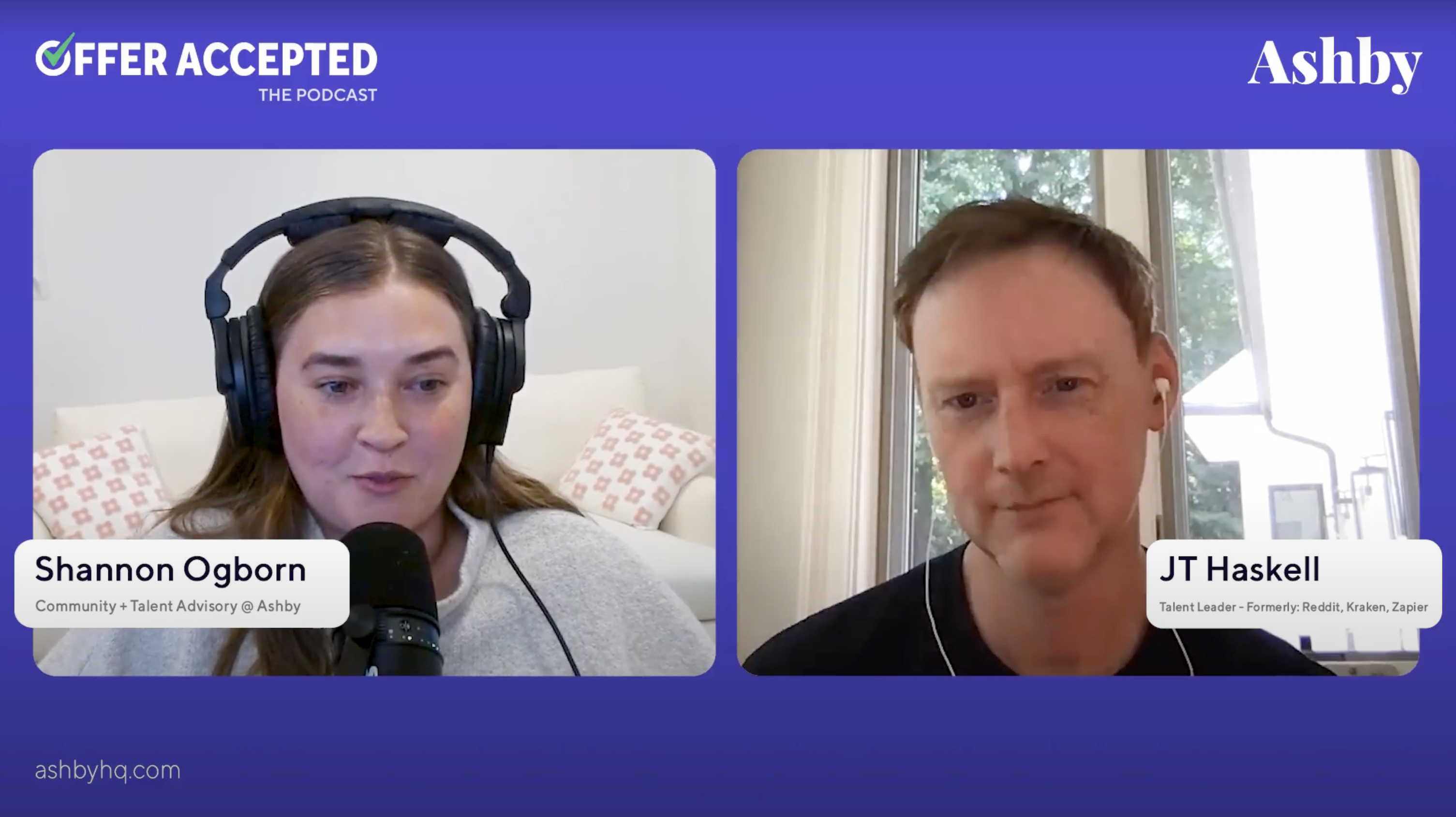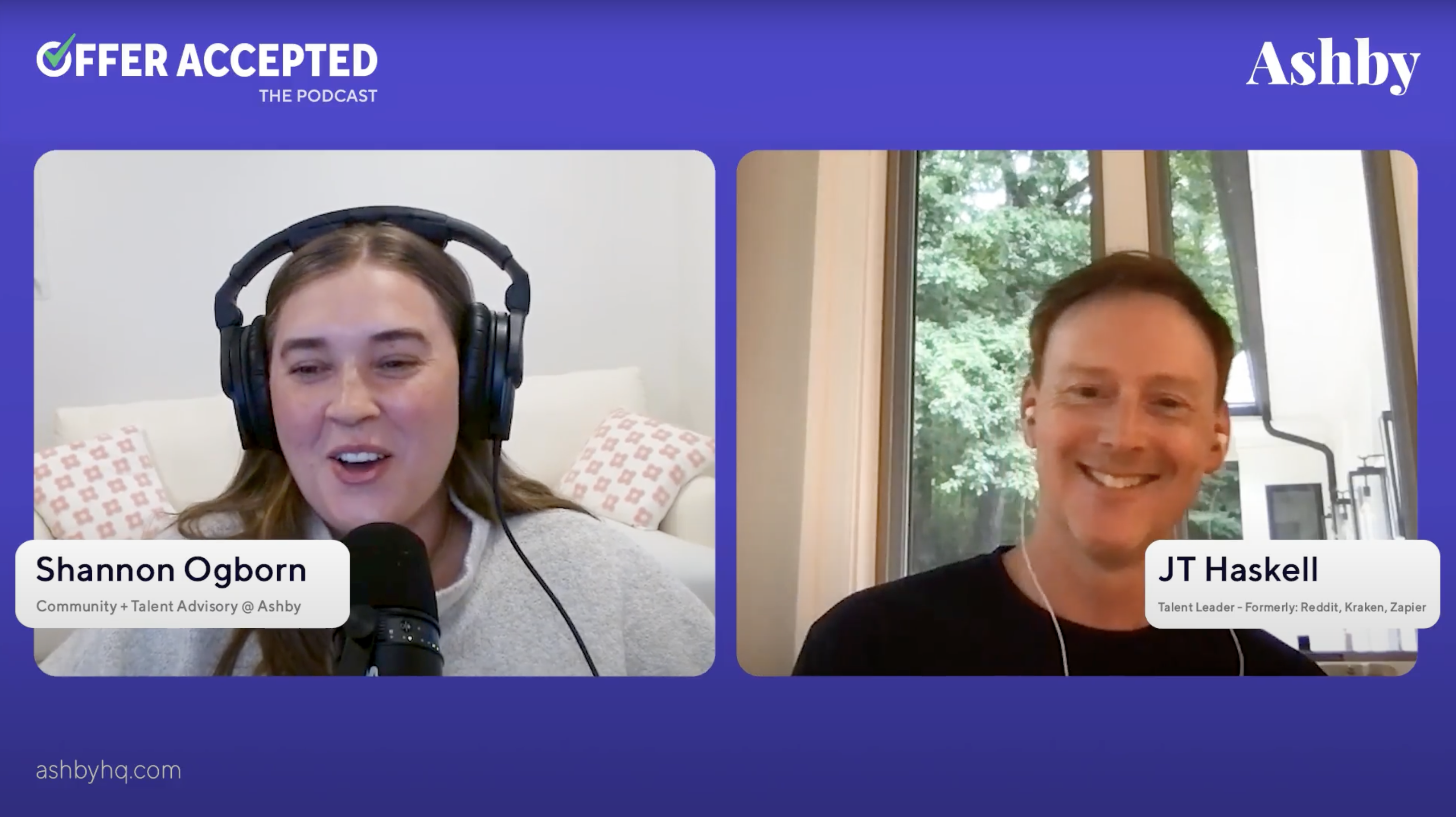Building Capacity Models
About this Episode
In this episode, JT Haskell, a talent acquisition leader with over 15 years of experience, shares how strategic capacity planning can help TA teams exceed hiring goals, prevent burnout, and keep recruiting processes running smoothly. JT's work with companies like Reddit, Zapier, and Kraken has shaped his approach to forecasting and building scalable TA teams.
We dive deep into how to integrate project work, accurately forecast hiring timelines, and ensure executive buy-in to create a sustainable and high-performing recruiting function.
Topics
This Episode's Guest
JT Haskell
Talent Leader @ Formerly: Reddit, Kraken, Zapier
JT started as a systems engineer and transitioned to recruiting over 15 years ago. For the last ten years he has been the head of TA for high growth tech startups like Airwatch, Pindrop, Zapier, Kraken, and Reddit. These companies hired hundreds of new team members as fast as possible while rasing the talent bar and diversity of the teams resulting in three successful acquisitions and most recently an IPO with Reddit.
Takeaway 1
Incorporate Time Off into Capacity Models 🗓️
When creating capacity models, it’s easy to overlook non-working days like holidays, vacations, and company-wide events. But accounting for these periods is essential to avoid overwhelming your team and keeping the hiring process on track.
Why It Matters:
By planning for downtime, you’re better equipped to predict how and when your team can realistically achieve its hiring goals. It helps maintain the flow of recruiting and avoids any slowdowns or bottlenecks that could arise when key team members are unavailable. This practice leads to more accurate forecasts and less pressure on your hiring team.
Quick Tips:
- Build in Buffer Time: When forecasting, incorporate realistic downtime into your model, including planned vacations, holidays, and unplanned absences. This gives your team breathing room and ensures that hiring goals aren’t overly optimistic. Without this buffer, workloads can quickly pile up, leading to rushed or delayed hiring decisions.
- Plan for Peak and Slow Periods: Use historical data to anticipate slower recruiting periods (like summer or year-end holidays) and adjust the pace of hiring accordingly. By recognizing these patterns, you can manage workloads and prevent unnecessary stress on your team during busy seasons.
- Proactively Communicate with Hiring Teams: Keep hiring teams informed about how non-working days will impact your hiring timelines. Provide clear explanations for how time off affects capacity, so leadership has realistic expectations about when hiring goals will be met and understands why adjustments may be necessary.
Takeaway 2
Over-Deliver on Hiring Goals 📈
Capacity models do more than just keep teams from overloading — they allow you to consistently meet or exceed hiring goals, positioning your team as a strategic partner in the business.
Why It Matters:
Predictability builds trust. When executives know they can count on your team to hit hiring targets consistently, it strengthens your credibility and opens doors for more strategic involvement. It also allows you to take control of hiring priorities, so the team delivers not just on numbers, but on quality hires, which in turn bolsters the company’s growth.
Quick Tips:
- Set Realistic and Data-Driven Targets: Use historical data on hiring speed and recruiter capacity to set realistic, achievable hiring targets. Ensure that these targets take into account role complexity and recruiting resources, so you’re not setting the team up for failure or overpromising to leadership.
- Give Regular Progress Updates: Provide ongoing updates to leadership regarding progress toward hiring goals. This helps maintain transparency and builds trust. If challenges arise, such as unexpected vacancies or changes in role requirements, communicate them early so leadership is aware of any potential shifts in timelines.
- Prioritize Key Roles: Focus on filling high-impact roles that will deliver the most value to the business. By concentrating on strategic positions, your team can exceed leadership expectations and prove their value. This may mean pausing less critical roles temporarily to ensure that high-priority hires are completed on time and to the highest standard.
Takeaway 3
Integrate Project Work to Reduce Burnout 🔄
Keeping recruiters engaged and motivated is essential for long-term success. By balancing their workload with meaningful project work, you reduce burnout and enhance overall team productivity.
Why It Matters:
Constantly working on open roles can lead to recruiter fatigue and disengagement, particularly in fast-paced, high-pressure environments. Incorporating project work breaks the monotony, offers a creative outlet, and allows recruiters to contribute to the business in strategic ways. This not only helps keep the team motivated but also encourages innovation and deeper engagement with the company’s broader goals.
Quick Tips:
- Adjust Workload Down: When assigning project work, reduce the number of active roles a recruiter is responsible for. This adjustment gives them space to fully focus on the project and execute it effectively without the pressure of maintaining a full hiring load.
- Communicate Capacity: It’s important to be transparent with stakeholders about capacity shifts during project work. This ensures everyone understands that while fewer hires might be completed during this period by the individual, the long-term benefits of investing in project work far outweigh the temporary reduction in output.
- Protect Recruiters’ Time: Make sure project work is prioritized alongside day-to-day tasks. To avoid overwhelming recruiters, create boundaries that allow them to dedicate uninterrupted time to project initiatives, ensuring they don’t become stretched too thin.
What Hiring Excellence Means to JT
For JT, hiring excellence is all about working in the future and using data to predict outcomes, not just react to them. As he puts it, “tThe greatest TA organizations work in the future.”.
He believes that excellent hiring requires trust and proactive planning. By using data to forecast hiring needs and presenting clear roadmaps to leadership, TA teams can ensure they’re seen as strategic partners, not just service providers. “If you’re not getting pings from leadership when headcount needs change, that’s a sign to improve your relationships,” says JT.
Excellence also means constantly evolving. "Who you hire this year may not be who you need next year." It’s important to continually assess your team’s hiring needs and ensure the process remains aligned with the company’s growth trajectory.

JT's Recruiting Hot Take
Automate everything you can, but never lose the human element. “Nearly every aspect of the TA process has a way to automate these days, from scheduling to scorecards,” he says. While automation can drastically improve efficiency, the key is to balance it with a personal touch. "You still need to show candidates you care about them, and that you want them there."

Timestamps
(00:00) Introduction
(04:00) Capacity planning and forecasting
(06:00) How to build a capacity model
(10:00) Prioritizing hiring needs in large companies
(12:00) Scaling down goals to achieve better outcomes
(15:00) The benefits of integrating project work into capacity models
(16:00) Considering time off and holidays in capacity planning
(21:00) How forecasting can help with business strategy
(23:00) JT’s hot take on automation in recruiting
(25:00) TA automation tools to check out
Other Episodes
Crafting an Authentic EVP That Attracts and Retains
In this episode of Offer Accepted, Cara Brennan Allamano discusses the critical role of an Employer Value Proposition (EVP) in talent acquisition. She breaks down what an EVP is, who should own it, and how to create one that aligns with both organizational goals and employee expectations. Cara emphasizes the importance of authenticity, stakeholder alignment, and regular reevaluation of the EVP to ensure it remains relevant. She also highlights the tangible results of a well-executed EVP, such as improved hiring metrics, stronger retention, and reduced time-to-hire.
Embedding Cultural Awareness to Strengthen Global Hiring
In this episode of Offer Accepted, Alex Corbin, Head of Talent Acquisition at Tabby, shares how cultural awareness, adaptability, and data-backed decisions have shaped the company’s global hiring success. He explains how building local expertise early, balancing flexibility with structure, and translating data into action have allowed Tabby to create an inclusive, scalable, and high-performing hiring engine across regions.

Join the Hiring Excellence movement
New episodes every month - subscribe here so you never miss out.
